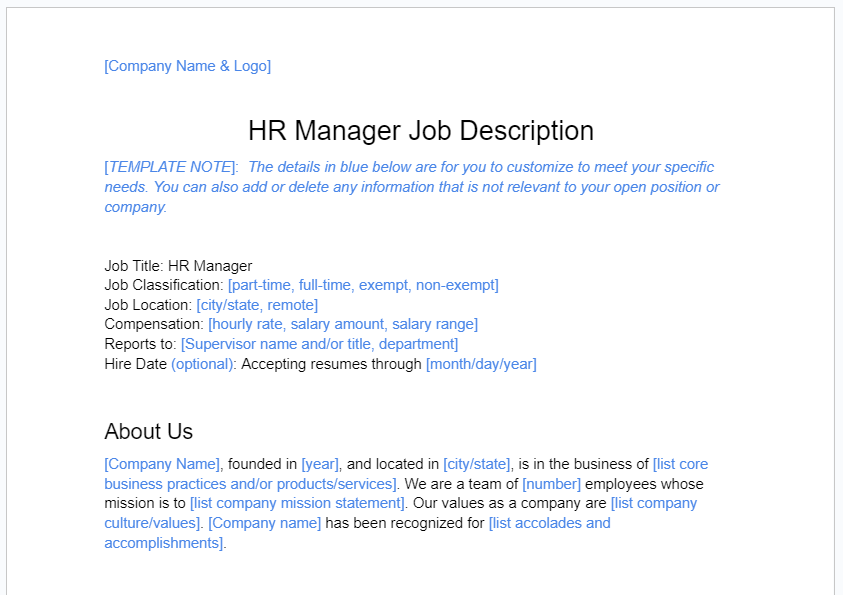Hiring an HR manager means finding a professional to plan and direct the human resources functions of a business. This includes overseeing staff, spearheading company recruiting efforts, managing the hiring process, and meeting with business owners to discuss HR objectives and compliance issues.
You must first list all the role requirements in the form of a job description. Download our free template below for an easier time. After that, you must advertise it on job boards, screen for the best candidate, and put your hiring decision in writing. Read on to learn how to hire an HR manager in just eight steps.
You can make the task of hiring an HR manager easier by using ZipRecruiter to find quality candidates. With ZipRecruiter, you can opt to use a premade job description to post your job ad, and the website will allow you to post to over 100 job boards with the click of a button. Start posting jobs for free.
Step 1: Determine Your HR Needs
In terms of HR needs and why human resources is important to you, every business is different. Maybe you’ve been handling HR-related matters alone and want to pass those duties off, or you’re noticing higher turnover and want an expert to assess your company’s situation and make changes. With the right tools, hiring a human resources manager can increase employee engagement, reduce turnover, and help your small business attract top talent in your industry—all while keeping your company compliant.
Assessing your needs will help you figure out what type of HR manager to hire. They can help do the following:
- Build and execute an HR strategy
- Manage company compliance and risk management
- Handle payroll and benefits administration
- Recruit and train new employees
- Manage employee documentation
- Handle disciplinary actions
- Hire and terminate employees
Hiring an HR manager can also help your business as it grows, as they typically have extensive knowledge of HR laws that might apply once you surpass a certain number of employees. If you don’t ensure compliance with these laws, you could face serious fines and penalties from government agencies or employee lawsuits.
Step 2: Write an HR Manager Specific Job Description
Treat hiring an HR manager just like hiring any other employee—starting with a job description. Some HR managers will have more hands-on experience dealing with personnel issues, while others will have more legal compliance experience. Knowing which type of employee you need will help you focus your job description. Jump back to the top and download our free HR Manager Job Description template if you haven’t yet.
List the specific duties and responsibilities in your job description. If you want to ensure legal compliance, for example, list employment law experience as a requirement. Regardless of the level of experience you need, there are certain skills every HR employee should have:
- Reliability
- Analytical Skills
- Ability to keep conversations and information confidential
- Conflict management skills
- Knowledge of HR best practices
- Prior use of HR software
You may want to adjust the title of the role depending on what type of employee you’re hiring as well. If you’re looking for a full-time in-house employee to manage all facets of your company’s HR, then “HR manager” will suffice. If you’re looking for a contractor, consider calling the position “HR business partner” or “HR consultant.” If this job requires someone slightly less experienced, consider using “HR administrator” or “HR generalist.” When you choose the right job title, potential candidates can see right away what level of qualifications you are seeking and how much they will be compensated.
Step 3: Decide Compensation Details
While you should have created a general budget for this position, make sure you research to ensure you’re offering a competitive rate. Look at what your competitors in your area offer new hires. The average HR manager’s salary is between $100,000 and $130,000 annually. The specific amount you need to pay will depend on the talents and experience of the person you’re hiring, where your business is located, and the duties you need this person to perform.
You also need to refer to your state laws. Some states require you to put a salary range in your job posting, so you’ll need to be prepared to make this information available to applicants.
Whatever you do, don’t shortchange the person—that often leads to resentment and a feeling that they are not a valued team member. You don’t have to spend a fortune, but you should pay a competitive wage.
Step 4: Post Your HR Manager Ad to a Job Board
You can post your open position on one or more of our recommended job boards. You should also consider posting to human resources-specific job boards, such as SHRM or iHireHR. These niche job boards will put your ad in front of already qualified and vetted candidates.
Your job ad should be a condensed version of your job description. It should include the following:
- Position overview: Include general information about your job—title, classification (full-time, exempt), location, compensation range, and hire date.
- Company and culture details: Describe your business and the type of culture a job seeker will find.
- Job details: List out the expectations of the position. We recommend that you limit this to about 10 key responsibilities.
- Skills and education: If you require certifications, such as PHR or sPHR, list them here. Also include any education requirements, like a bachelor’s degree in human resources.
- Compensation: Although you’ve mentioned the range in your position overview, expand on compensation details here. Be sure to include any performance bonuses or commissions included.
- How to apply: While this is at the end of your job ad, this is probably the most important part of the ad. Job seekers need to know how to apply for the position, whether it be sending an email or applying directly on the job board.
Step 5: Screen Applicants for HR Skills & Experience
To help you quickly sort applicants, have a list of your must-have qualifications. Having a short list of half a dozen top skills and qualifications will help you screen the resumes faster and more effectively.
For instance, if you need your HR manager to help keep your company compliant, look for qualifications that show experience managing corporate compliance, like someone with a law degree. If your HR manager position is more focused on performance management, look for candidates with HR certifications.
We strongly recommend asking for referrals. Whether from your own employees or other small business connections, referrals are often some of the best hires companies make. They’re more likely to fit your company culture and stick around. If you don’t have one yet, check our guide to creating an employee referral program—we even provide a policy template to ensure the process goes smoothly.
Step 6: Schedule Interviews With Top Candidates
After you have reviewed the applicants, it’s time to schedule interviews with the most qualified individuals. Try to keep your interviews to just a handful of people. You don’t want to overwhelm yourself with too many potential hires. Read our guide to learn more about the interviewing process.
During the interviews, ask similar questions of every candidate so you can evaluate them on similar responses. Consider posing real-world situations to candidates to see how they would have handled the issue with your company.
Here are some good questions to ask every candidate:
- What are the most important policies you would review or create in your first month?
- How do you ensure confidentiality when someone makes an HR complaint?
- Tell me about a time you handled a difficult and tense HR situation.
- Have you recommended or created any HR policies? If so, please explain.
- Tell me about your experience building and leading an HR team.
A few of the above questions attempt to have the candidate respond to situational questions. While you’re not intentionally trying to trip anyone up, you want to make sure the candidates are familiar with some basic HR laws. You need to rely on this person to keep your company compliant. If they don’t know basic employment laws, they may put your company at risk.
Pro Tip: Check out our list of best interview questions for more questions to ask candidates and our list of illegal interview questions for those to avoid.
Step 7: Put Your HR Manager Job Offer in Writing
Once you have determined the candidate you want to hire, send a formal offer letter to the chosen candidate. In the offer letter, make sure to include important details like title, salary, start date, and benefits. Be sure to include the job description and have them sign off on it, attesting to their ability to handle the core duties of the position.
Give the new employee about a week to return the offer letter. This gives them time to review it and speak with any family members.
Step 8: Onboard Your HR Manager
Your final step in hiring an HR manager is to properly onboard them to your company. This sets up the new employee for success by showing them what your company is like and preparing them for their new position. Good employee onboarding practices start with providing your new HR manager with onboarding materials including company policies, an employee handbook, payroll documents, and an organizational chart so your employee knows who to contact.
Next, hold a formal new employee orientation. This crucial step helps acclimate your new HR manager to your company culture and their new role. Continue to check in with your HR manager by holding regular performance reviews—30 days, 90 days, and one year.
Benefits of Hiring an HR Manager
Hiring an HR manager will help streamline the recruitment process and your entire human resources department. They are skilled at attracting top talent and building a strong team that aligns with your company’s goals and culture. In addition, an HR manager can:
- Foster a positive work environment: By implementing effective employee engagement strategies, HR managers can boost morale, increase productivity, and reduce turnover rates.
- Ensure legal compliance: An effective HR manager can handle complex employment laws and regulations, ensuring your company remains compliant and avoids potential legal issues.
- Improve workforce productivity: By having an HR manager focused on effective talent management strategies, you can better attract and retain top talent that drives performance and business growth.
- Streamline recruiting process: Their proficiency in conducting interviews and assessments helps in identifying top candidates efficiently. They save your company time and resources by finding the right talent to make your company successful.
- Handle employee relations: HR managers are key to effectively handling conflict resolution, fostering open communication, and effectively listening to the concerns of employees. They help build trust by promoting transparency in decision-making processes and showing genuine care for the well-being of employees.
Hiring HR Manager Frequently Asked Questions (FAQs)
As your company grows so will your HR needs. When things get overwhelming for your current staff and you are noticing inconsistencies and errors, it may be time to hire an HR manager to oversee your human resources operations.
The best way to recruit an HR manager is by showcasing your company culture and explaining why they would want to work for you. Additionally, be sure to offer a competitive compensation package that includes an attractive base pay and robust benefits.
The easiest way to hire an HR leader is to post a job ad on job boards, such as ZipRecruiter, and social media boards, such as LinkedIn. The best job boards allow you to post to multiple job boards, track applicants, and manage job postings. In your job ad, be specific about the skills and experience you are looking for and give the candidate a way to apply for the position.
An effective HR manager should possess the following qualities—communication, problem-solving, HR expertise, conflict resolution, integrity, confidentiality, and be a strategic thinker. Look for previous human resources experience, certifications, and people management skills.
Bottom Line
Hiring an HR manager doesn’t have to be a laborious process. With the right tools at your disposal and a clear grasp of what you need this person to do, you can make an informed decision. But don’t rush it—if you cannot find the right person for the job, keep looking. This is a critical position, and you’ll need someone qualified to assist you in keeping your small business compliant and your employees engaged.
For help finding the right HR manager, consider ZipRecruiter. It has a built-in applicant tracking system to help you vet and sort potential candidates. Plus it posts to over 100 regular and niche job boards (Google, FlexJobs, Salary.com, LinkedIn, X, and more). Learn more about ZipRecruiter’s features and pricing in our review.



